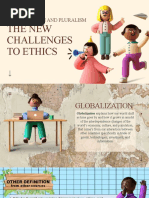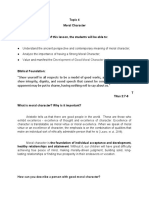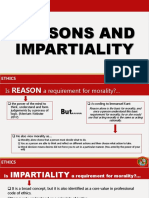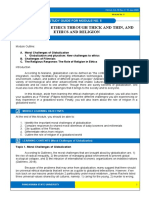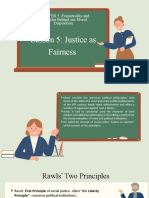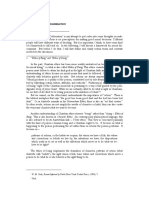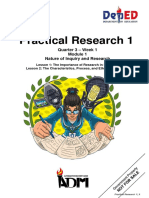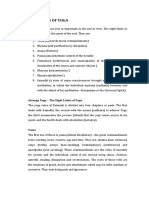0 ratings0% found this document useful (0 votes)
351 viewsConclusion: Ethics Through Thick and Thin: Lesson1 Globalization and Pluralism: New Challenges in Ethics
Conclusion: Ethics Through Thick and Thin: Lesson1 Globalization and Pluralism: New Challenges in Ethics
Uploaded by
Jellu Casta OinezaGlobalization and pluralism present new ethical challenges. As the world becomes more interconnected through globalization, differing moral views must be respected. Millennials and Filinnials embrace secular and humanist values over religious doctrine, which also presents challenges in dealing with morality. They are more likely to delay adulthood and live with parents longer than previous generations.
Copyright:
© All Rights Reserved
Available Formats
Download as PPTX, PDF, TXT or read online from Scribd
Conclusion: Ethics Through Thick and Thin: Lesson1 Globalization and Pluralism: New Challenges in Ethics
Conclusion: Ethics Through Thick and Thin: Lesson1 Globalization and Pluralism: New Challenges in Ethics
Uploaded by
Jellu Casta Oineza0 ratings0% found this document useful (0 votes)
351 views22 pagesGlobalization and pluralism present new ethical challenges. As the world becomes more interconnected through globalization, differing moral views must be respected. Millennials and Filinnials embrace secular and humanist values over religious doctrine, which also presents challenges in dealing with morality. They are more likely to delay adulthood and live with parents longer than previous generations.
Original Description:
ethics
Original Title
E-CHAP6_L1-L2
Copyright
© © All Rights Reserved
Available Formats
PPTX, PDF, TXT or read online from Scribd
Share this document
Did you find this document useful?
Is this content inappropriate?
Globalization and pluralism present new ethical challenges. As the world becomes more interconnected through globalization, differing moral views must be respected. Millennials and Filinnials embrace secular and humanist values over religious doctrine, which also presents challenges in dealing with morality. They are more likely to delay adulthood and live with parents longer than previous generations.
Copyright:
© All Rights Reserved
Available Formats
Download as PPTX, PDF, TXT or read online from Scribd
Download as pptx, pdf, or txt
0 ratings0% found this document useful (0 votes)
351 views22 pagesConclusion: Ethics Through Thick and Thin: Lesson1 Globalization and Pluralism: New Challenges in Ethics
Conclusion: Ethics Through Thick and Thin: Lesson1 Globalization and Pluralism: New Challenges in Ethics
Uploaded by
Jellu Casta OinezaGlobalization and pluralism present new ethical challenges. As the world becomes more interconnected through globalization, differing moral views must be respected. Millennials and Filinnials embrace secular and humanist values over religious doctrine, which also presents challenges in dealing with morality. They are more likely to delay adulthood and live with parents longer than previous generations.
Copyright:
© All Rights Reserved
Available Formats
Download as PPTX, PDF, TXT or read online from Scribd
Download as pptx, pdf, or txt
You are on page 1of 22
CHAPTER 6:
Conclusion: Ethics through
Thick and Thin
Lesson1
Globalization and Pluralism: New Challenges
in Ethics
Globalization and Pluralism
Globalization has made the world into a single interconnected community.
Politically, economically, and culturally therefore, communities across the
world not function in what is fundamentally a shred space although divided
into artificial political condominiums called nation-states.
In a globalized era, peoples and community across the world have become
culturally connected, the distinction between the global and the local has
become progressively blurred and actions and events in one locality can
carry with it the potential to breed transnational and transgenerational
impacts.
Pluralism
Pluralism is a concept used in many diverse ways, but in
general terms, it is the philosophical theory that there is
more than one basic substance or principle, whether it be
the constitutions of the universe of the mind and body, the
sources of truth, or the basis of morality.
MORAL Pluralism
Also known as ethical pluralism and value pluralism, moral pluralism is
the idea that there can be conflicting moral views that are each worthy of
respect.
It this implies that there are some values which may be equally correct and
fundamental, and yet in conflict with each other.
Moreover, moral pluralism proposes that in many cases, such incompatible
values may be incommensurable, in the sense that there is no objective
ordering them in terms of importance.
MORAL Pluralism
Moral pluralism is a meta-ethical theory, rather than a theory of normative
ethics or a set of values in itself.
Russian-British social an political theorist, philosopher, and historian of idea
Isaiah Berlin (1909-1997) is credited with being the first to popularize a
considerable work describing the theory of objective value-pluralism; taking it
to the attention of the academe.
However, the pertinent idea that basic values can and, in some cases, do
conflict with each other has already been prominent in the thought of the
German sociologist and philosopher Max Weber (1864-1920).
MORAL Pluralism
Moral pluralism seems to advocate flexibility when faced with competing
perspectives. It evaluates issues from various moral standpoints in deciding
and taking action.
An example if value-pluralism is the notion that the moral life of a nun is
incompatible with that of a mother, yet there is no strictly rational measure of
which is preferable.
It thus concludes that ethical decisions frequently necessitate radical
preferences with no rational calculus to decide which alternative to be chosen.
GLOBALIZATION
Globalization may be defined as the world-
wide integration of government policies,
cultures, social movements, and financial
markets through trade and the exchange of
ideas.
GLOBALIZATION
Globalization emphasizes the increasing trans-
border or transnational relations, which are
occurring in the contemporary world.
Globalization, in effect restructure our social space
or geography from one that is mainly territorial to
one that is increasingly transnational.
GLOBALIZATION
Globalization is said to have began after World War II and has
accelerated since the mid 1980s, driven by two factors.
The first is the technological advances that have reduced
the cost of transportation, communication, and
computation.
The other factor has to do with business escalating
liberalization of trade and capital markets. (establishment
of the IMF. GATT, and the World Trade Organization.
PROBLEMS WITH GLOBALIZATION
Author Gail Tverberg enumerates some reasons why
globalization is not living up to what was ideally expected to it,
and is, in fact, our very major problem today.
The following are the entries from “Twelve Reasons Why
Globalization is a Huge Problem” by Tverberg:
1. Globalization uses up finite sources more quickly.
2. Globalization increases world carbon dioxide emissions.
3. Globalization makes it virtually impossible for regulators
in one country to foresee the worldwide implications of
their actions.
PROBLEMS WITH GLOBALIZATION
4. Globalization acts to increase world oil prices.
5. Globalization transfers consumption of limited
oil supply from developed countries to developing
countries.
6. Globalization transfers jobs from developed
countries to less developed countries.
PROBLEMS WITH GLOBALIZATION
7. Globalizations transfers investment spending
from developed countries to less developed
countries.
8. With the dollar as the world’s reserve currency,
globalization leads to huge US balance of trade
deficits and other imbalances.
9.Globalization tends to move taxation away from
corporations and onto individual citizens.
PROBLEMS WITH GLOBALIZATION
10. Globalization sets up a currency “race to the
bottom,” with each country trying to get an export
advantage by dropping value of its currency.
11.Globalization encourages dependence on other
countries for essential goods and services.
12.Globalization ties countries together, so that if one
country collapses, the collapse is likely to ripple through
the system, pulling many other countries with it.
ETHICAL CHALLENGES OF
GLOBALIZATION
Rising neoliberal globalization and
laissez-faire capitalism.
Loss of state sovereignty and the takeover
of international financial institutions.
Environmental and ecological
consequences.
CHAPTER 6:
Conclusion: Ethics through
Thick and Thin
Lesson2
Challenges of Filinnials and Millennials
MILLENIALS
Also known as “Generation Y” or the “Net
Generation,” are the demographic cohort directly
following Generation X.
There are no exact dates when this cohort starts and
ends, although demographers and researchers
normally use the late 1970s to early 1980s as
starting birth years and the mid-1990s to early
2000s as ending birth years.
MILLENIALS AND FILINNIALS
The Center for Generational Kinetics mentions five
generations that presently make up our society and
specifies birth years for each generation as follows:
Gen Z, iGen, or Centennials: Born 1996 and later
Millennials or Gen Y: Born 1977 to 1995
Generation X: Born 1965 to 1976
Baby Boomer: Born 1946 to 1964
Traditionailists or Silent Generation: Born 1945
and before
MILLENIALS AND FILINNIALS
Millennials are generally the children of baby
boomers and older Gen Xers, Fillinnials is a term
used to denote the Filipino Millennial.
Filinnials’ generation is commonly characterized by
an increased use and familiarity with
communications, media, and digital technologies.
MILLENIALS AND FILINNIALS
Seven basic traits are ascribed to Millennials:
Special, sheltered, confident, team-oriented,
conventional, pressured, and achieving.
Their being “team-oriented”, nonetheless, is questioned,
as one study reveals that they have “a sense of
entitlement and narcissism, based on personality surveys
showing increased narcissism among Millennials
compared to preceding generation when they were teens
in their twenties.”
Some psychologists this consider Millennials to be part of
what is called “Generation Me” instead of “Generation
We.”
MILLENIALS AND FILINNIALS
Ethical Outlook and Cultural Identity
Millennials are also labeled as the “Boomerang Generations” or
“Peter Pan Generation”, because of their perceived tendency for
delaying some rites of passage into adulthood for longer periods
than most generations before them and for living with their parents
for longer periods than previous generations.
Generation Y members are very upbeat and more open to change
than older generations. Based on a survey by the Pew Research
Center in 2008, Millennials are “the most likely of any generation to
self-identify as liberals and are also supportive of progressive
domestic social agenda than older generations”.
MILLENIALS AND FILINNIALS
Secularism and Humanism
Secularism is basically a non-theistic belief system or
a worldview which does not acknowledge supernatural
or divine views of reality. As such, it includes atheism,
agnosticism, naturalism, materialism, scientism,
Darwinism, and other ideologies that reject all spiritual
explanations of the world.
Humanism is a system of thought which gives
emphasis to the value of human beings and favors
man’s thoughts over faith or religious doctrine.
MILLENIALS AND FILINNIALS
Secularism and Humanism
Millennials are less openly religious than the
older generations. About one in four millennials
are unaffiliated with any religion, which is more
than the older generations when they were the
ages of Millennials.
Especially in dealing with morality, Millennials are
more likely to advocate secularism and
humanism.
You might also like
- The Moral Agent - EthicsDocument6 pagesThe Moral Agent - EthicsJohn Carlo Tarlit100% (1)
- Ethics Foundations of Moral Valuation - Lesson 1Document3 pagesEthics Foundations of Moral Valuation - Lesson 1Jason Carbon Enmanuel100% (1)
- PluralismDocument39 pagesPluralismCristine Jane Moreno Camba100% (3)
- Religion and GlobalizationDocument30 pagesReligion and GlobalizationCherrylyn PedrajasNo ratings yet
- Ethics - Reason and Will and Moral TheoriesDocument28 pagesEthics - Reason and Will and Moral TheoriesGlenn Bello100% (3)
- Chapter 2-Lesson 1&2Document14 pagesChapter 2-Lesson 1&2Alyssa Grace CamposNo ratings yet
- Lecture Notes GEC 7Document3 pagesLecture Notes GEC 7Fire Heart100% (1)
- CHAPTER 1 - The Self From Various PerspectivesDocument4 pagesCHAPTER 1 - The Self From Various PerspectivesJaylina Mabulay100% (1)
- Defining Public InterestDocument10 pagesDefining Public InterestJamie FerrisNo ratings yet
- Group 9Document38 pagesGroup 9Christine Logdat100% (1)
- Ethics Through Thick and Thin, Ethics and ReligionDocument21 pagesEthics Through Thick and Thin, Ethics and ReligionFrances Aira Butel Somera100% (1)
- Globalization and PluralismDocument13 pagesGlobalization and PluralismPaula Rodalyn MateoNo ratings yet
- Globalization and Pluralism: New Challenges To EthicsDocument41 pagesGlobalization and Pluralism: New Challenges To EthicsBlessed Mae JacintoNo ratings yet
- Week 7 HOW IS MORAL CHARACTER DEVELOPED STAGES OF MORAL DEVELOPMENTDocument3 pagesWeek 7 HOW IS MORAL CHARACTER DEVELOPED STAGES OF MORAL DEVELOPMENTKristine Joy DungganonNo ratings yet
- Moral Theories and Mental Frames: By: Prof. Katherine E. Evasco Sociology Department, BUCSSPDocument14 pagesMoral Theories and Mental Frames: By: Prof. Katherine E. Evasco Sociology Department, BUCSSPNathaniel RemendadoNo ratings yet
- Chapter 8 Moral Theories and Mental FrameDocument30 pagesChapter 8 Moral Theories and Mental FrameFallaria Paulo A.No ratings yet
- Feeling and Moral Decision MakingDocument32 pagesFeeling and Moral Decision MakingMarieannz Ronquillo OcampoNo ratings yet
- Module 4 - Culture and MoralityDocument11 pagesModule 4 - Culture and MoralityFra KENo ratings yet
- Module 2 EthicsDocument3 pagesModule 2 Ethicsfrederick liponNo ratings yet
- Levels of Moral DilemmasDocument21 pagesLevels of Moral DilemmasHazel Abila100% (1)
- What Makes An Experience A Moral Experience?Document1 pageWhat Makes An Experience A Moral Experience?Danielle CorpuzNo ratings yet
- Perdev 10 Understanding The Self (Siec)Document3 pagesPerdev 10 Understanding The Self (Siec)Rudy Camay100% (1)
- Ethics and Education: PresenterDocument22 pagesEthics and Education: PresenterDnc PerezNo ratings yet
- Topic 4 Moral CharacterDocument5 pagesTopic 4 Moral Charactercool kidNo ratings yet
- Semi-Final Week No.: 14 Module No.: 11 Main Topic: Sub TopicsDocument4 pagesSemi-Final Week No.: 14 Module No.: 11 Main Topic: Sub TopicsJhon Mark RabeNo ratings yet
- ETHICS-Lesson II MORAL AGENTDocument4 pagesETHICS-Lesson II MORAL AGENTCamparicio Parillo Reca EllaNo ratings yet
- MODULE in ETHICS-2 The Moral AgentDocument7 pagesMODULE in ETHICS-2 The Moral AgentiamysaaahhhNo ratings yet
- Cultural and Moral BehaviorDocument30 pagesCultural and Moral BehaviorEdcel John MartinezNo ratings yet
- Moral Standards vs. Non Moral StandardsDocument3 pagesMoral Standards vs. Non Moral StandardsGohan Dave Agmata100% (1)
- The Moral Agent: Prepared By: Ms. Hazel Faith D. CarreonDocument32 pagesThe Moral Agent: Prepared By: Ms. Hazel Faith D. CarreonRachel Bautista100% (4)
- Unit 1 - Introduction To EthicsDocument8 pagesUnit 1 - Introduction To EthicsAndrea DawnNo ratings yet
- 2moral and Non-Moral StandardsDocument26 pages2moral and Non-Moral StandardsSheryl Gee100% (1)
- Ethics Chapter 1Document24 pagesEthics Chapter 1Gion Konrad Hingada RabaraNo ratings yet
- Frameworks and Principle Behind Our Moral DispositionDocument15 pagesFrameworks and Principle Behind Our Moral DispositionPrincess Siblag Concepcion100% (1)
- Chapter 1 Moral Agent. Lesson 1 and 2 For StudentsDocument50 pagesChapter 1 Moral Agent. Lesson 1 and 2 For Studentsiamysaaahhh100% (1)
- Millenials and Filinnials Ethical Challenges and ResponsesDocument3 pagesMillenials and Filinnials Ethical Challenges and ResponsesChristian EspirituNo ratings yet
- Lesson2 Foundation of Morality VENDEMIATI PDFDocument9 pagesLesson2 Foundation of Morality VENDEMIATI PDFKyla MarieNo ratings yet
- Political Self UtsDocument13 pagesPolitical Self UtsJinken Shane SalvatierraNo ratings yet
- Group3 The Development of Moral Character of Moral Agent EspantoHipolitoLepitinNamoc 1Document5 pagesGroup3 The Development of Moral Character of Moral Agent EspantoHipolitoLepitinNamoc 1Novelyn Duyogan100% (1)
- Justice and FairnessDocument4 pagesJustice and FairnessGaby TaniosNo ratings yet
- Freedom and Moral ActsDocument19 pagesFreedom and Moral ActsNieva Marie EstenzoNo ratings yet
- Lesson 6 - Reason and Impartiality As A Minimum Requirement For MoralityDocument4 pagesLesson 6 - Reason and Impartiality As A Minimum Requirement For MoralityMark Louie RamirezNo ratings yet
- Pagkamaka-Diyos: Faith Alone Bro. Andrew Maria, MMHCDocument8 pagesPagkamaka-Diyos: Faith Alone Bro. Andrew Maria, MMHCJoyceVersalesNo ratings yet
- Freedom As A Foundation of EthicsDocument3 pagesFreedom As A Foundation of Ethicseys100% (2)
- Moral and Non-Moral StandardsDocument1 pageMoral and Non-Moral StandardsMelo fi60% (1)
- Module 1 - GE107Document12 pagesModule 1 - GE107roderikoNo ratings yet
- MODULE 13 Ethics Through Thick and ThinDocument7 pagesMODULE 13 Ethics Through Thick and ThinCristobal M. CantorNo ratings yet
- Ethics - Module 3Document20 pagesEthics - Module 3Dale CalicaNo ratings yet
- Ethics BlablaDocument17 pagesEthics BlablaChristian Neil Maghuyop100% (2)
- Learning Outcomes:: The Material SelfDocument65 pagesLearning Outcomes:: The Material SelfRejasNo ratings yet
- Understanding The Self (Chapter 2)Document79 pagesUnderstanding The Self (Chapter 2)Jessa Espinosa75% (4)
- Ethics Lesson 2Document8 pagesEthics Lesson 2Melissa Marie CustodioNo ratings yet
- Unit III Lesson 2 St. Thomas Aquinas and The Christian Context 1Document77 pagesUnit III Lesson 2 St. Thomas Aquinas and The Christian Context 1cheesesiz yumNo ratings yet
- Conclusion - Ethics Through Thick and Thin, and Ethics and ReligionDocument4 pagesConclusion - Ethics Through Thick and Thin, and Ethics and ReligionJOHN PATRICK GARCIANo ratings yet
- Lesson 2 - Moral Standards and Non-Moral StandardsDocument11 pagesLesson 2 - Moral Standards and Non-Moral StandardsLynneth L. Maijin83% (6)
- My Reflection On The Self As A Product of SocietyDocument1 pageMy Reflection On The Self As A Product of SocietyAllyana Marbella RiveroNo ratings yet
- Lesson For Week 9 - 11 Ix. The Moral AgentDocument15 pagesLesson For Week 9 - 11 Ix. The Moral Agentroselyn ayensaNo ratings yet
- Module 2 Lesson 1 Culture in Moral BahaviorDocument47 pagesModule 2 Lesson 1 Culture in Moral Bahaviorzzrot1100% (1)
- Ethics Group 9 HandoutDocument3 pagesEthics Group 9 HandoutMofidahNo ratings yet
- EthicsDocument18 pagesEthicsKenberly DingleNo ratings yet
- Ethics Through Thick and Thin and Ethics and ReligionDocument65 pagesEthics Through Thick and Thin and Ethics and ReligionROMASANTA, Eubby Mae P.No ratings yet
- Frameworks and Principles Behind Our Moral Disposition: Lesson 5: Justice As FairnessDocument28 pagesFrameworks and Principles Behind Our Moral Disposition: Lesson 5: Justice As FairnessJellu Casta OinezaNo ratings yet
- Activity Number 1: Pangasinasn State University Lingayen, Pangasinan NAME: Ethel N. Ulanday Section: Bsba - 3BDocument3 pagesActivity Number 1: Pangasinasn State University Lingayen, Pangasinan NAME: Ethel N. Ulanday Section: Bsba - 3BJellu Casta OinezaNo ratings yet
- Through huma-WPS OfficeDocument1 pageThrough huma-WPS OfficeJellu Casta OinezaNo ratings yet
- Introduction RPHDocument2 pagesIntroduction RPHJellu Casta OinezaNo ratings yet
- Lab 3Document1 pageLab 3Jellu Casta OinezaNo ratings yet
- Judith Becker - Music and TranceDocument12 pagesJudith Becker - Music and Trancevals100% (1)
- 1932 Robinson Psychiana Course Lesson 19 BDocument13 pages1932 Robinson Psychiana Course Lesson 19 BVinny Terranova50% (2)
- PH 104 Notes On Moral DeliberationDocument12 pagesPH 104 Notes On Moral Deliberationminchion0% (2)
- Islamization of KnowledgeDocument15 pagesIslamization of KnowledgeIdhanivNo ratings yet
- 2 Values Education Reviewer Part 2Document49 pages2 Values Education Reviewer Part 2Darren Christian Ray LangitNo ratings yet
- PHILOSOPHIES OF DEFEAT The Jargon of FinitudeDocument2 pagesPHILOSOPHIES OF DEFEAT The Jargon of FinitudeColman HoganNo ratings yet
- Practical Research 1: Quarter 3 - Week 1 Nature of Inquiry and ResearchDocument4 pagesPractical Research 1: Quarter 3 - Week 1 Nature of Inquiry and ResearchEdcel CruzNo ratings yet
- SamkhyaDocument133 pagesSamkhyaKokNo ratings yet
- Stuart Hackett The Rediscovery of The Highest GoodDocument250 pagesStuart Hackett The Rediscovery of The Highest Goodhan100% (1)
- Bohnert, Herbert Gaylord - The Semiotic Status of CommandsDocument14 pagesBohnert, Herbert Gaylord - The Semiotic Status of CommandsClarice AraujoNo ratings yet
- Reled 111 Learning Module For PrelimDocument22 pagesReled 111 Learning Module For PrelimChristian Niel TaripeNo ratings yet
- Discernment of Vocation According To Aquinas, Ignatius, and Pope John Paul IIDocument3 pagesDiscernment of Vocation According To Aquinas, Ignatius, and Pope John Paul IIBrunoNo ratings yet
- Theory Building AMRDocument22 pagesTheory Building AMRShahid IqbalNo ratings yet
- Education of Religious FanaticDocument15 pagesEducation of Religious FanaticMuhammad Yusuf Musa100% (2)
- Emancipated Spectator - Boal RanciereDocument14 pagesEmancipated Spectator - Boal RanciereLuka RomanovNo ratings yet
- Is The Cognitive Revolution' A Myth?: Sandy HobbsDocument4 pagesIs The Cognitive Revolution' A Myth?: Sandy HobbsAlan DavidNo ratings yet
- Re-Thinking Dionysius The Areopagite - Church HistoryDocument3 pagesRe-Thinking Dionysius The Areopagite - Church HistoryzbiralecNo ratings yet
- Educational Philosophy of Gautama BuddhaDocument5 pagesEducational Philosophy of Gautama BuddhaChrelyn MarimonNo ratings yet
- Catapoti DespinaDocument318 pagesCatapoti DespinaManos LambrakisNo ratings yet
- Miderms PPGDocument4 pagesMiderms PPGruanNo ratings yet
- Bangko Sentral NG PilipinasDocument22 pagesBangko Sentral NG PilipinasmaczkieNo ratings yet
- Mindgames: Doeslanguageframepolitics?Document13 pagesMindgames: Doeslanguageframepolitics?enviNo ratings yet
- Rhetorically Accurate VerbsDocument2 pagesRhetorically Accurate Verbsapi-263378375100% (1)
- 6 Rules of Categorical SyllogismDocument16 pages6 Rules of Categorical SyllogismYvette Dizon100% (1)
- 3 - The Stages of YogaDocument12 pages3 - The Stages of YogaSudhir Kumar MishraNo ratings yet
- The A Posteriori Quia Demonstration of The Existence of GodDocument21 pagesThe A Posteriori Quia Demonstration of The Existence of GodPaul Horrigan100% (1)
- HegalDocument27 pagesHegalmaha irfanNo ratings yet
- IB Theatre Survival GuideDocument4 pagesIB Theatre Survival Guideshadenhs100% (1)
- Soc 101 Class ExamDocument10 pagesSoc 101 Class Examgaius014No ratings yet











